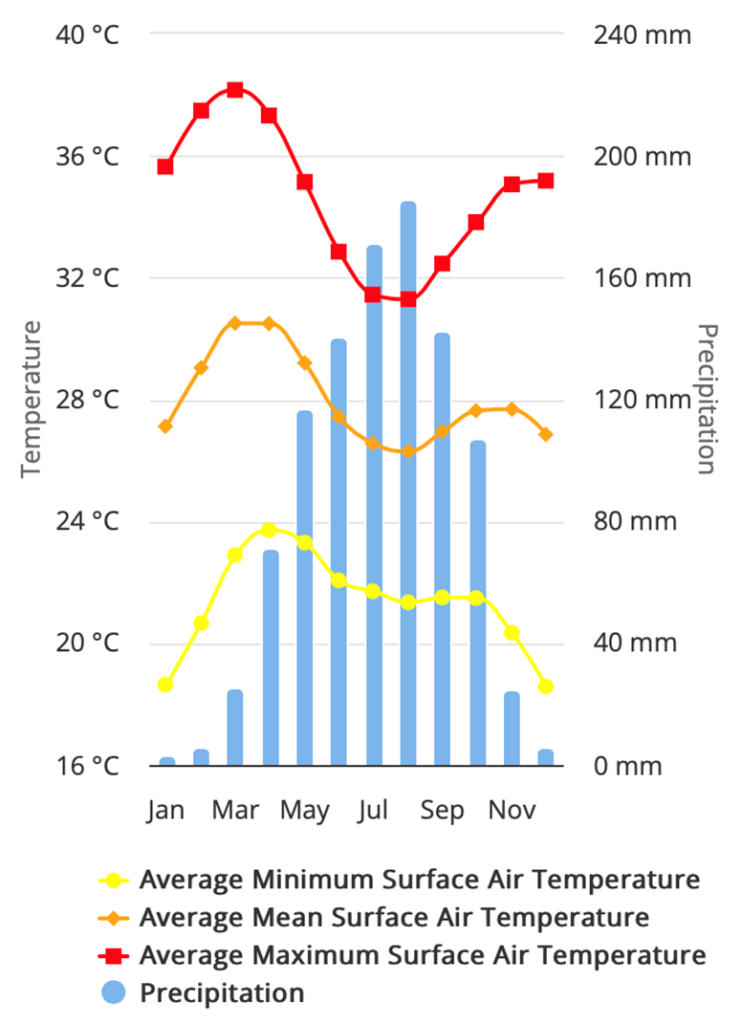South Sudan is experiencing “extreme heatwaves” and is shutting schools and cutting power, reports BBC meteorologist Matt Taylor. “It is exceptionally early for South Sudan to experience such heat – temperatures often exceed 43°C but only in the summer months, according to the World Bank’s Climate Change portal,” he states. Hot days in the capital Juba – five degrees north of the equator – are for some a big ‘climate change’ story, but it is difficult to read into the World Bank data the interpretation that Taylor wants to publicise. In fact it is impossible, since the data clearly show that average South Sudan temperatures peak in March and then fall away through the wet monsoon ‘summer’ months.

Quite how Taylor can draw the conclusion from the above World Bank graph that it is “exceptionally early” for South Sudan to experience such heat, in a place where temperatures often exceed 45°C “but only in the summer months”, is not clear. Anybody else looking at the graph would draw the opposite conclusion. Perhaps Taylor is unclear on the difference between rainfall totals (the blue bars, which do peak in the “summer months”) and average temperatures. He also seems to be unaware that South Sudan is equatorial so does not have a “summer” and certainly not in June through August.
In fact the “heatwaves” in South Sudan drew headlines in other climate-crazed mainstream media. The New York Times reported on March 20th that: “Climate change already worsened floods and droughts in the young nation. Now soaring temperatures are forecast for two weeks.” Both the BBC and NYT write about temperatures soaring well past 40°C, but, as is often the case, we must count the spoons and consult the original sources when dealing with such unreliable propagandists.

According to the Time and Data website, in the five days up to March 21st the temperature in Juba only once went over 40°C at midday. Since a 42°C high last Sunday, the temperature has dropped up to 6°C. Hot, it would seem, but not exceptional at the equator.
But the BBC was in full disaster mode with Taylor reporting that South Sudan is the latest in a “long-line” of countries to experience blistering and, in many cases, record-breaking heat. “This heat is very serious, and it’s really affecting our work,” says Wadcom Saviour Lazarus, who is said to run an NGO. “Because of this heat we are not able to move from one place to another,” he adds. Juba resident Ayaa Winnie Eric is said to take “lots of water to keep me hydrated”. Light clothes are worn and walking in the hot sun is avoided.
How did people cope in the past living right next to the equator? Of course they didn’t have ‘climate change’ alarmism to cope with as another World Bank graph below demonstrates.

The graph plots the temperatures for South Sudan going back to 1901. On a five year smoothing average, the temperature in 2022 at 27.64°C was only 0.41°C higher than 121 years ago. Interestingly, since 2007 the average temperature has actually dropped a full degree centigrade from 28.64°C to 27.64°C. Looking at the cyclical nature of the graph, it is difficult to see a correlation with trace atmospheric carbon dioxide which has of course risen throughout the period.
The Taylor story is another crass example of the constant fearmongering undertaken in the mainstream media to nudge populations to accept the collectivist Net Zero project. In this case it can only be assumed that readers will take the hint over devasting human-caused climate change and not look at the underlying data. South Sudan is a hot, under-developed African country that has been racked by civil war. Infrastructure is basic, electricity and air conditioning frequently fails. Meanwhile, the population of Juba has risen tenfold since the 1970s to reach half a million.
The investigative journalist Paul Homewood is an excellent source for the constant stream of BBC climate howlers. In fact he runs an annual review of some of the best BBC bloopers. How we laugh when we read his latest publication noting that “extreme weather linked to climate change” has eroded the soft sand cliffs of the Norfolk village of Happishburgh. No mention, needless to say, of the findings of the British Geological Society that it is likely the Norfolk cliffs have been “eroding at the present rate for about the last 5,000 years”. Who can forget the report that bee-eater birds have turned up in Norfolk, which was reported to be a worrying sign, “unmissable” no less, of how our climate is changing. It was a shame to spoil the story by noting that bee-eaters have been frequent visitors to England in the past. One archive alone lists 80 sightings between 1793 and 1957.
No doubt, to be cont’d.
Chris Morrison is the Daily Sceptic’s Environment Editor.












To join in with the discussion please make a donation to The Daily Sceptic.
Profanity and abuse will be removed and may lead to a permanent ban.
“Disinformation is one of the gravest threats weighing on our democracies,” he says.
This is absolsutely true, but it is the Governments who are using it to push narrative and silence opposition. Ergo, the Governments are the gravest threats to our democracies.
I must say, I’ve had doubts about how far Musk will go in his ‘free speech’ campaign. I dont think it reasonable for him to withdraw from the EU, so I expect he will sail somewhere close to the line, without actually crossing it.
Withdrawing from the EU might get people’s attention, though most likely people would blame Musk not the EU.
Musk can’t take on the EU by himself.
If the population were ready to see him as a champion and rally behind him to fight for free speech, then obviously he could.
But we’ve seen how spineless the population is. Many of them have offered up their children as guinea pigs for untested jabs to appease a menacing state bureaucracy, so…
I think it would do more harm than good for him to take that step, yes.
There’s little support for freedom of speech, at least in the UK and Europe, among people I speak to. People will tell you they like the idea, but when you start quoting types of speech (“hate”, “misinformation”) and ask if they should be allowed they will tell you “no of course not”.
It would also probably be suicidal.
I don’t see Twitter’s withdrawal from the EU’s code of practice an empty gesture. It is a signal. Now, one can debate what the signal is.
It might just be to try to look good. Or it might be a signal of measured defiance which says – ok, you might be forcing me to comply by turning a code into law, but I will t least, with my gesture, show you I don’t agree with it or like it.
I don’t know how committed Musk really is to free speech. I doubt few do. But if one assumes he is, how he plays his cards is anything but simple. It would be fiendishly complicated to try to runTwitter as a free speech platform in today’s regulatory environment, if that was what one wanted to do, without being destroyed by the heavy hand of ever more oppressive and authoritarian states.
My guess is that he’s trying to do his best, but I am ready to be disappointed and discover I’ve been naive.
I’ve said it before and I will say it again – Musk doesn’t give a flying duck about Free Speech.
Surely Twitter need to replace the display of offending content with a message saying banned in the EU. If people are really interested they can use a VPN to avoid this. If enough people are annoyed then there will be push back.
The EU appears not to want Twitter being what it is but wants something else instead.
The EU should build its own ‘service’ as it wants it to be – I’m sure they could make it just as popular eventually.
I hope Elon has the power and the balls to withdraw Twitter from the EU territory.